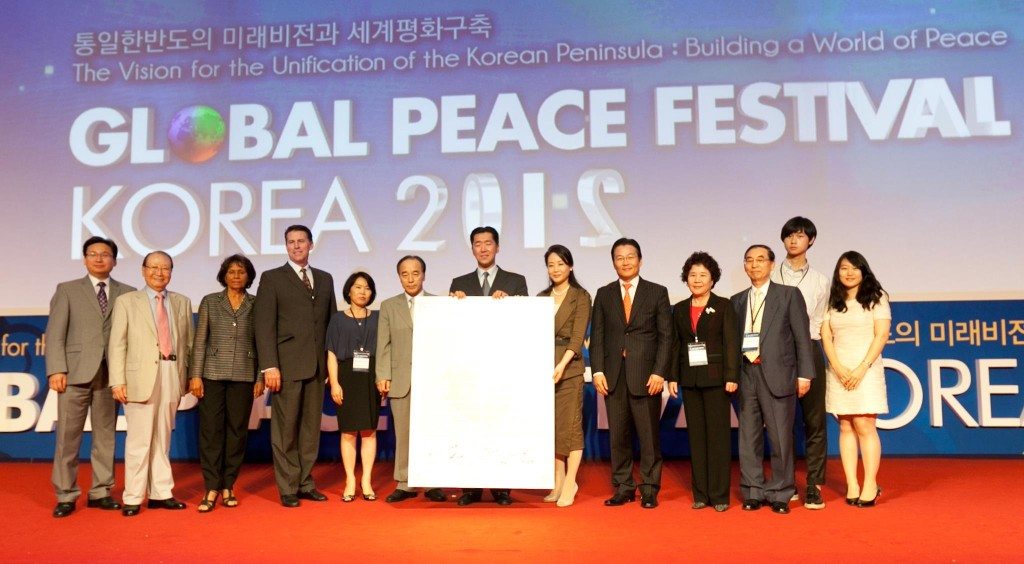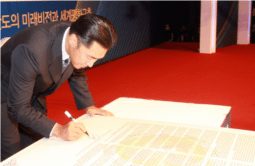
On occasion of the Global Peace Leadership Conference entitled: “The Vision for the Unification of the Korean Peninsula and Building a World of Peace,” the following declaration was signed by government officials, NGO and faith leaders, scholars and journalists.
Unification Declaration
August 19, 2013
For more than sixty years, the Korean homeland has been divided, causing untold suffering and hardship for the Korean people. Despite the decades-long hardening of this political division, the passage of time cannot erase our deep longing to reunite with our families and inherit the spirit of our forebears as one people. Thus, there must come a time when this divided people determines it unacceptable that these hostilities continue to exact such a toll on this country and the world. Such a determination can awaken the enduring hopes of our people to dwell together in one homeland, and motivate a new initiative for resolving this division and realizing the dream of unification. Toward that end, it is proper and necessary that we, the undersigned, make this Unification Declaration, and understandable that an anxious international community would expect an account of our intentions to resolve this enduring division and global flashpoint.
Long before Korea became a bloody ground upon which foreign powers competed for regional domination, the Korean people, as one nation, pursued a destiny rooted in noble ideals. The roots of Korean spiritual and cultural identity extend back more than four millennia, to the era of Gochosun, the original Korean nation. The founding principles of Gochosun – “Hong Ik In Gan” (to broadly benefit the world); “Jae Se I Hwa” (to make the world truthful); “I Do Yuh Chi” (to govern the world by principles); and “Gwang Myung I Se” (to govern the world by bright light) –are the basis for the traditional Korean ideals of respecting life and nature, living for others, and honoring the one, benevolent, and transcendent “Haneunim.”
No greater injustice could be visited upon a people than to bar them from their destined path to fulfill such ideals. For more than sixty years, we have endured this very injustice in violation of our most basic right as Koreans: to live in a nation as one people with a common destiny. Although Koreans share a unique homogenous identity, language, and five-thousand-year cultural history, these alone have not been sufficient to break down the walls that divide our nation. Thus an even greater measure than those must be called upon to illuminate the common bonds that unite all Koreans and, thus, draw the nation together.
That greater measure must transcend all ethnic, cultural, political and ideological divisions and arrive at the very core of our common humanity. That essence, endowed by the Creator, is the foundation of our shared human value and identity. It compels all to cherish justice and freedom, to form loving families, and to seek the greater good. Because of the inherent nature and rights given to all by the Creator, every person can lay claim to life, liberty and the pursuit of happiness as a natural birthright. Acknowledging this endowment to all people, we also recognize the universal promise for all to engage one another as co-equal members of one family under God.
Thus, the Korean people, as owners of these fundamental human rights, must re-establish a national path toward our original destiny, affirming the founding principles of Gochosun, and thereby embracing the values of faith, strong family ties, and service to others in alignment with our national character that honors exceptionalism, altruism and self-reliance. Once that destiny is fulfilled, the Unified Korea can shine as a beacon of hope to nations throughout the world.
Such a nation requires a representative government that safeguards those sacred rights, drawing its just and limited powers from the consent of the Korean people. However, if that future unified government becomes inattentive to or destructive toward those ends, and after having exhausted all means to correct those wrongs, it is the right of the people to reorganize, realign or restructure its government around those fundamental principles that establish the rights of the people to life, liberty and the pursuit of happiness.
Our long history and shared heritage as one Korean people have been torn asunder by an artificial division. Our families have been separated from their loved ones, unable to visit their hometowns. The unresolved conflict, and the escalation of hostilities that even rises to the threatened use of nuclear weapons, leave Korea in constant fear of war, causing a tremendous psychological as well as economic burden on our people. We will create a bitter legacy for our posterity if we allow these hostilities to continue and that division to become permanent.
The time has come to reclaim the dream of our forebears. Our homeland was meant for one people, yet stands today as a house divided. This civil war must end. It has divided our people and crippled our hopes for a bright future. Therefore we, the Korean people – North and South –must find common cause in our shared heritage, and in our understanding of the founding principles of Gochosun, the original Korean nation. On that basis we can come together to build the unified Korea as a nation of the highest ideals; one that recognizes the ultimate authority present within the sovereignty of God (Haneunim).
Therefore, we the undersigned, on this day, do solemnly declare that the Korean people are to be, justly and by right, one family, one people, and one nation. We will work together to fulfill this vision of the Unified Korea, realizing our historical legacy and establishing a shining example for generations to come.
For the fulfillment of this declaration and vision for the Unified Korea, we pledge our total dedication and unending commitment, as affirmed by our signatures hereto:

